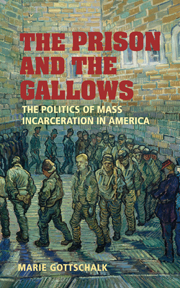Book contents
- Frontmatter
- Contents
- List of Figures and Table
- Preface and Acknowledgments
- 1 The Prison and the Gallows: The Construction of the Carceral State in America
- 2 Law, Order, and Alternative Explanations
- 3 Unlocking the Past: The Nationalization and Politicization of Law and Order
- 4 The Carceral State and the Welfare State: The Comparative Politics of Victims
- 5 Not the Usual Suspects: Feminists, Women's Groups, and the Anti-Rape Movement
- 6 The Battered-Women's Movement and the Development of Penal Policy
- 7 From Rights to Revolution: Prison Activism and the Carceral State
- 8 Capital Punishment, the Courts, and the Early Origins of the Carceral State, 1920s–1960s
- 9 The Power to Punish and Execute: The Political Development of Capital Punishment, 1972 to Today
- 10 Conclusion: Whither the Carceral State?
- Notes
- Select Bibliography
- Index
- Titles in the Series
10 - Conclusion: Whither the Carceral State?
Published online by Cambridge University Press: 05 September 2012
- Frontmatter
- Contents
- List of Figures and Table
- Preface and Acknowledgments
- 1 The Prison and the Gallows: The Construction of the Carceral State in America
- 2 Law, Order, and Alternative Explanations
- 3 Unlocking the Past: The Nationalization and Politicization of Law and Order
- 4 The Carceral State and the Welfare State: The Comparative Politics of Victims
- 5 Not the Usual Suspects: Feminists, Women's Groups, and the Anti-Rape Movement
- 6 The Battered-Women's Movement and the Development of Penal Policy
- 7 From Rights to Revolution: Prison Activism and the Carceral State
- 8 Capital Punishment, the Courts, and the Early Origins of the Carceral State, 1920s–1960s
- 9 The Power to Punish and Execute: The Political Development of Capital Punishment, 1972 to Today
- 10 Conclusion: Whither the Carceral State?
- Notes
- Select Bibliography
- Index
- Titles in the Series
Summary
“The way prisons are run and their inmates treated gives a faithful picture of a society, especially of the ideas and methods of those who dominate that society. Prisons indicate the distance to which government and social conscience have come in their concern and respect for the human being.”
– Milovan DjilasThe emergence and consolidation of the U.S. carceral state was a major milestone in American political development that arguably rivals in significance the expansion and contraction of the welfare state in the postwar period. What we have witnessed is a “durable shift in governing authority,” to use Karen Orren and Stephen Skowronek's elegant definition of what constitutes political development. The state began to exercise vast new controls over millions of people, resulting in a remarkable change in the distribution of authority in favor of law enforcement and corrections at the local, state, and particularly the federal level.
This book takes the carceral state as a central object of historical study whose construction was an important chapter in American state-building and not just the manifestation of a successful political whim by strategic conservative politicians. This political development had multiple and “dispersed causes” that pre-date the 1960s. The central focus has been on the political development of penal policy. But my account touches on some other important and recurrent themes and debates in American political development. First, it challenges the common understanding of the U.S. state as weak.
- Type
- Chapter
- Information
- The Prison and the GallowsThe Politics of Mass Incarceration in America, pp. 236 - 264Publisher: Cambridge University PressPrint publication year: 2006

